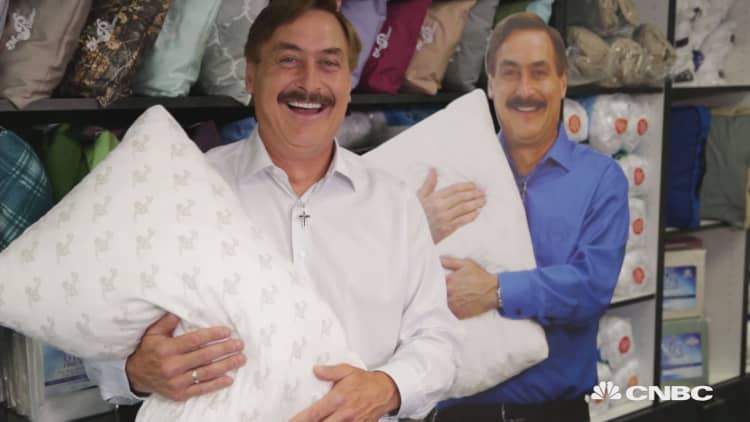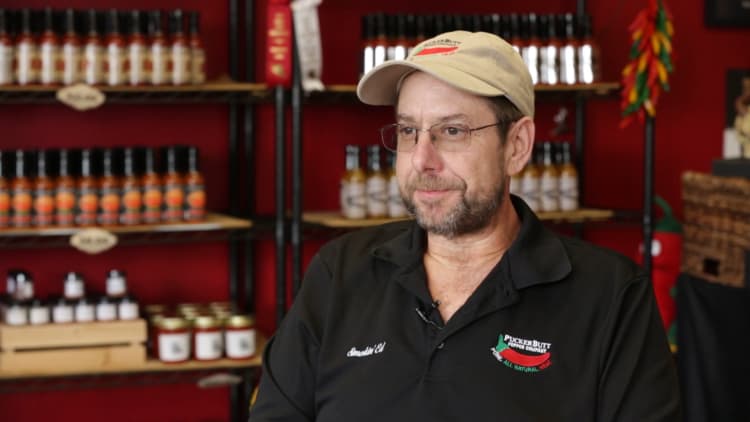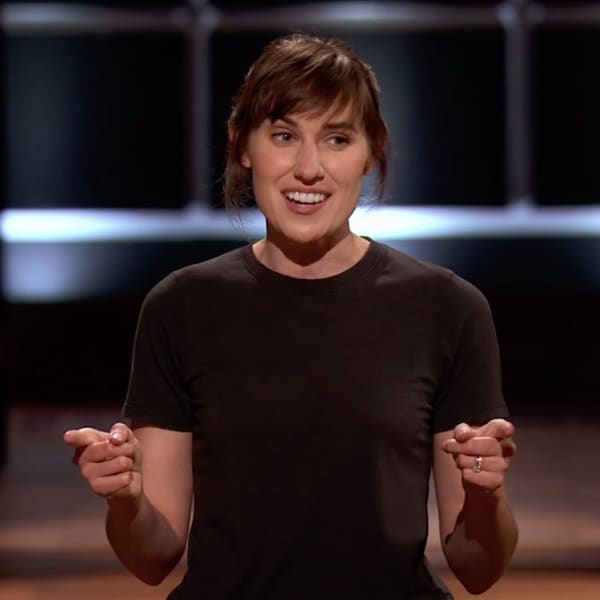Ed Currie runs a successful business, goes to church and supports community programs in his hometown of Fort Mill, South Carolina.
He's also a recovering addict who had some trouble with the law. Then an angel saved him, only to turn him into a bit of a devil.
"I like to hurt people," Currie says.
He certainly does. The 55-year-old self-proclaimed "mad scientist" makes the world's hottest hot sauces from the world's hottest peppers for PuckerButt Pepper Company. His Smokin' Ed's Carolina Reaper holds the Guinness World Record for hottest pepper.
Yours truly sampled a few, and I paid a steep price. More on that later.
How hot is hot?
A pepper's "heat" is measured in Scoville Heat Units (SHUs), a scale of sorts named after pharmacist Wilbur Scoville. He created a method for measuring the amount of capsaicin concentration in a pepper, the main ingredient which gives chili its kick. Ed Currie says most jalapeño peppers measure around 3,000 SHUs. His hundreds of breeds of peppers are much hotter, especially the Carolina Reaper.
"Most of the peppers we're dealing with are around 1.5 million Scoville Heat Units or higher," he says, "so you're looking at 300 times the heat of a jalapeño."
What it's like eating something that hot?
"When you first eat a raw Carolina Reaper, everybody goes, 'Ah, that's not so bad. Oh, it tastes good,'" Currie says. Then the capsainoids hit you like a fire truck. "The heat usually starts down in your throat, and then comes up into your face, and then you're just done," he explains. "The mucus membranes start going, snot starts pouring out of your mouth, you have uncontrollable saliva."
But wait, there's more!
A short time after eating the peppers, customers often suffer debilitating cramps. Currie has seen people collapse into a fetal position on a cold tile floor until the pain passes. And the next morning when the peppers or hot sauce leave your body?
"The majority of people call it something like 'ring sting,'" says Currie. Hence the name PuckerButt.
Sounds Iike fun.
For beginners, Currie suggests following up any pepper sampling with bananas, donuts or protein bars to help with recovery.
Even breathing the air in Currie's store can make one's eyes water and throat feel a little raw, but he is oblivious. In fact, he starts every morning with a few drops of his own private hot sauce tincture.
He also insists super hot peppers cannot kill you. (Theoretically capsaicin toxicity could be deadly, but your body would not allow you to digest enough extreme chilis to do the job.) Indeed, Currie says they can actually be good for you. The pain they cause is followed by something similar to a runner's high.
"I won't lie to you, eating a Carolina Reaper is like eating lava, it hurts when you initially eat it," Currie says, "but eventually that endorphin rush takes over, and it feels good."
PuckerButt Pepper's founder says last year sales were around $1.5 million, most of it wholesale to food manufacturers. Revenues are growing around 26 percent a year.
"If I told you 10 years ago that this would be happening, you would call me a bold faced liar," Currie says, hardly believing it himself.
That's because there was a good chance none of this would happen. It took a "come to Jesus" moment. Like, almost literally.
Pre-pepper problems
"I started studying peppers back in 1981 when I went to college," says Currie.
He grew up in Michigan and ended up on the seven-year college plan, bouncing from school to school. "I liked drinking with the frat boys," he says.
Currie eventually became a stock broker. His first day on the job after passing his Series 7 test was October 19, 1987, also known as Black Monday, when global markets collapsed.
"That was a sign from God, I think," says Currie.
Currie kept chasing money over the next decade, though not always legally. "I wanted money so that I could keep on partying," he says. "I was a functional addict, essentially...I was miserable on the inside."
Finally, one night in 1999, "I wanted to die," he says.
There was a blizzard that night in the Michigan town where Currie was living, and he says he opened all the doors and windows of his condo to let the snow in, planning to lay down and freeze to death.
"I just had that hole, that hole that all people in addiction know," he explains.
Then he saw a vision: "I saw this angel, it was a white apparition." Currie says it was a female, "and that apparition told me to go to a certain place." Currie says the angel told him to look for particular signage, though he didn't recognize it. So he packed up his Camaro "with a bunch of booze and drugs and guns" and started driving in the blizzard. "I actually stopped at a friend of mine's house, just because I wound up there, and they knew where the sign was for this place," Currie says. "We drove the next morning to it, and it turned out to be a rehab facility, and I got clean."
Sober with salsa
Ed Currie decided he wanted to move back home to his parents' place in South Carolina and start growing peppers again (his mother was a master gardener). Peppers became his passion.
"When I was able to get out of Michigan legally, I came down here right away." (When asked what legal issues kept him in Michigan, he laughs. "Honestly, I'd have to ask the attorney.")
At recovery meetings in his new hometown, he met "a hot blonde" who wasn't interested in him. But one night after a meeting, Currie overheard her talking about how much she loved salsa, so he brought her some made from his peppers.
"Nine months later we were married," says Currie.
His bride, Linda, convinced him to start bottling his hot sauces for sale.
Currie had been working in banking at the time to make some money, but in 2003 he cashed out all his savings and maxed out every credit card he could get his hands on to start PuckerButt Pepper Company. He estimates his startup costs were around $400,000.
"I was an idiot. I started reading all the rules and all the laws, and I insured myself for a whole lot of money, because I didn't want to kill anybody," he says.
Currie estimates first year revenues were $89,000.
He started selling product at farmers markets. Then he caught the eye of local media. In 2009, a graduate student from a local college did some testing on his peppers and declared them the hottest in the world.
"Someone got that on the internet, and then the internet just caught fire," Currie says.
Hot growth
The world record claim, later validated by Guinness, spurred tremendous growth. Currie's hot sauces later became famous on the Youtube hit show, "Hot Ones," where celebrities suffer through a series of ever hotter wings, ending with one covered in "The Last Dab."
Now Currie is a millionaire. He employs 14 staff, with 120 other people working indirectly for the company at several farms.
"I think we're up to just shy of 500,000 plants this year," he says.
Currie is expanding acreage and his product line. He not only sells hot sauces, he sells his own seeds, even to potential rivals.
"Somebody else getting good is only going to make me better," he says.
However, he keeps a stash of super secret seeds which are hotter than anything he's released so far.
"I've dealt with some botanists and geneticists who think that we can actually get a natural pepper in the 7-8 million (SHUs) range."
It was time to see if I had what it takes to be a hot sauce heroine.
Taste test
Look, I love hot sauce, I put it on everything. But I was reluctant to try something which might make me end up on the floor with cramps. Currie convinced me to start small.
I barely put the tip of my tongue into the first sample on a small spoon (Currie does not recommend letting your lips make contact with the sauce). It was his take on sriracha, but it was hotter than any sriracha I'd ever had. It was also a little sweet. And, well, it really wasn't so bad. The initial shock subsided fairly quickly.
So we moved on to a slightly hotter hot sauce, a habanero. No problem! I took a taste, dealt with the heat, recovered quickly and wanted more, even as my eyes were tearing and nose starting to run.
"Don't blow your nose too hard," Currie warns me.
He explained to me that women can often handle the heat better, because Ph levels vary between the sexes. Emboldened by that, I continued to try more samples, powering through various Carolina Reaper products, including the infamous "Last Dab." Currie even gave me a taste of his own private tincture, which I kind of enjoyed.
He was amazed. "You did better than any other news reporter that's been here."
Wellllllllll....
I didn't, as it turns out.
I thought I was fine. The endorphins kicked in, and I was feeling great! We moved on to visit Currie's greenhouses, and then one of his farms. It was a lovely afternoon!
But two hours after sampling his peppers, Currie and I were walking through the woods...and I had to stop. I could not go on. I sat down on the ground, then I laid down. Cramps similar to labor pains gripped my lower regions. I thought I was going to die.
"Oh that happens," Currie says.
A producer on this story, Nate Skid, had also sampled peppers earlier and also suffered cramps (which made me feel superior at the time). Skid had made himself vomit to relieve the pain.
"Thirty seconds of pain to feel much better, Jane," he recommends.
I took his advice. It worked. But my pride in being some sort of pepper champ evaporated in the woods that afternoon.
Still, was it worth it? Of course it was! I got to try the hottest hot sauce in the world with the man who created it.
Peppers and purpose
Ed Currie says peppers have saved his life in more ways than one. He believes they've prevented the heart disease which plagued his family health history.
"One of the things I've studied was that the populations that have no indices of heart disease or cancer — unless they've been Westernized — are all around the Equator," he says. "One of the five things you can standardize with those populations is capsacinoids. They eat them with every meal." (Some studies suggest capsaicin can be good for heart health.)
But the peppers have also given him purpose. Being in the fields, "spending time with God," helped Ed Currie stay clean and sober, and he gets emotional thinking about how much his life has changed.
"My purpose is to show that anybody," and here he pauses, "I'm getting goosebumps thinking about it." He quickly recovers. "I can show that no matter how low in life you get, there's always a chance to succeed," Currie says. "You just have to ask for help."
More from Strange Success: How one man went from homeless to cancer patient to a millionaire art dealer
Like this story? Check out the Strange Success podcast.

This story was revised to correct the description of Youtube show "Hot Ones."






